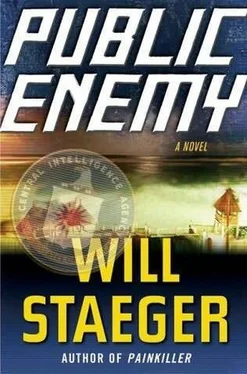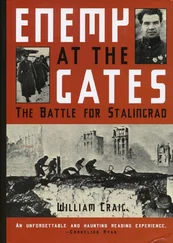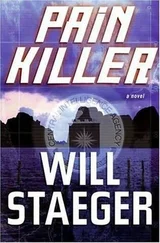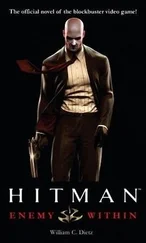Considering where Márquez lived, Cooper wasn’t exactly looking forward to the task Laramie would be handing him. If he agreed to do what he knew she’d be asking-ordering-and fulfill his duty as the Twenty Million Dollar Thug, he mused that his immediate future would resemble the fate of an aging Vietnam vet who’s just learned a new war has been declared against the communist regime in Hanoi-and this time, the Army is pleased to inform you, we’ve decided to draft men in their mid-fifties to go and do the fighting!
Cooper peeled off his tank top-the words LIVE SLOW emblazoned on the front, SAIL FAST on the back-and started down to the ocean. He hit the water and kept walking until it reached his waist, then stopped, planting his hands on his hips, and peered around Naples’s white-sand slice of relative paradise.
The beach was almost entirely empty-as might, he thought, be expected on this weekday morning. No boats in sight, no kites hanging in the wind, no fishermen kicked back with their poles dug into the sand near the water’s edge.
There’s something to the idea of confronting one’s past, he thought. You get lucky and maybe you get to taste a distilled form of redemption-something that all the Maker’s Mark, painkillers, even the finest Mary Jane in the world would never quite match. Cooper had felt it-maybe he’d even known it was on the way-when he’d looked into the eyes of the rebel soldier guarding the bogus checkpoint in Guatemala.
He’d felt how he craved the confrontation-to peer in at the abyss that was his past. To figure out, by going back, how to establish some kind of comfort level with the hell you knew, and still know. And maybe, in so doing, to find a way of living with myself without the aid of the charming batch of pharmaceuticals, spirits, and hemp I routinely consume in my busy attempt at distorting the ugly visions of my past and present.
Of course he knew this was coming.
Hell-taken along with the guaranteed presence of the ever-annoying yet annoyingly ever-pleasant Julie Laramie, he decided he might even have to confess that the job they were about to hand him was the reason he’d agreed to sign on to begin with. That, and the case it seems I somehow agreed to take as detective-to-the-dead-that priestess statue being my second-ever client.
You knew they would ask you to go back-and that’s why you propositioned them at the all-too-reasonable price of twenty million bucks.
He dove into the shallow waves. After looping down to the bottom, he dolphin-kicked his way around, moving at considerable speed a few inches from the sandy, shell-studded ocean floor. He kept his eyes open, clocking the scenery in the clear water. He swam parallel to the beach for a few dozen yards, heading for the air above only once his lungs were set to burst-at which point he popped into the bright sunlight, breaking the surface in a glittery shimmer of sunshine and foam.
Just because I knew they’d send me back doesn’t mean I’m looking forward to it.
He ducked back into the salty silence.
Laramie handed him the faxed, heavily blacked-out copy of the two-page memorandum with the words PROJECT ICRS on its subject line. He saw immediately there were seven names on the distribution list, and that the memo had come from an entity called RESEARCH GROUP. Cooper took a swallow from his second pint glass of Bass Ale. Their food orders had yet to arrive, and after the seven-mile run, even he-quasi-retired operative with a liver to match Hemingway’s-was already feeling the effects of the brew.
He read the page and a half of text. The document described an amount of funding-blacked out-that had been dedicated to “unconventional counterbioterror research relating to infectious viral pathogens,” with a mention that the pathogens subject to “vaccination research” included viral hemorrhagic fever, “aka filoviral strains.” The research, it was reiterated, would be “conducted for the purpose of the development of suitable vaccinations or immunizations for strategic national defense use.” The author of the memo, speaking on behalf of the “Research Group,” wrote that the group “hereby authorizes the establishment of the proposed ‘Project Icarus’ research facility at which to conduct these operations.” The memo was dated “3 August 1979.” The location and other details of the facility were either not included in the memo or had been redacted.
Though it was fairly straightforward, Cooper read through the memo a second time before setting it facedown on the clear plastic tabletop, thinking, having followed the grainy words on the pages, that his theory on the place the snuffer-outers worked was becoming uncomfortably incontrovertible.
“Interesting memo,” he said.
“Yes. And by the way, I have personally broken six or seven laws in showing that document to you over lunch. But since such egregious security clearance violations seem to be emerging as my specialty, let’s stick to the more important reasons behind our lunch meeting.”
She plucked a celery stick from the veggie plate the waitress had brought with their drinks and snapped off a bite. As she spoke, Cooper felt another twinge of guilt-now that he’d let the human lie detector machine out of her cage, the snuffer-outers may well get handed to him on a silver platter-but he wondered how well he would do at sparing her from their wrath.
“Obviously the memo speaks for itself,” she said. “It is no longer a stretch to connect the dots between an illegal U.S.-funded biological weapons lab, a filovirus outbreak near that lab that managed to erase an entire village of people, a survivor who made it out and paid a visit on a local mission’s health clinic-and, somehow, the subsequent appearance of a similar or identical strain of genetically altered filovirus that is about to be used as a weapon of mass destruction within U.S. borders.”
Cooper nodded. “Agreed-it’s no longer a stretch.”
“The other thing about that memo,” she said, “the part not included on the page, is that Messrs. Knowles, Cole, and Rothgeb determined while I was making my way to your little kingdom on the bay here that every man on that memo’s distribution list is dead.”
Cooper raised his eyebrows.
“All of them were murdered,” Laramie said. “Separately, and, mostly-actually, in all cases but one-by the method of execution-style beheading.”
“They’re all dead?”
“Every name on the page,” she said.
The snuffer-outers, he thought, have been busy.
But as he thought that through, sipping from the pint of Bass, he considered that it didn’t fit. Didn’t mean it wasn’t the case; it just didn’t fit. The names on the distribution list of the memo must, he thought, all be on Uncle Sam’s payroll-and unless he’d been wrong from the beginning, it was his own status as a CIA hack that had spared his life. So far. It just didn’t make sense for the snuffer-outers to have iced the members of the memo’s distribution list sometime back, before they’d elected to try to take him out-and on top of it all, he found it unlikely federal government snuffer-outers would use execution-style beheadings anyway. Not exactly one of the top weapons of choice, as he and Riley had discussed near Cap’n Roy’s pool, of hired contract killers sent at the behest of U.S. government officials.
Last he checked, for example, he didn’t keep a machete under his pillow at Conch Bay.
Cooper decided he would operate under the theory that somebody else had performed the beheadings. This didn’t mean there wasn’t somebody who knew the details, however, just the way that somebody might have known the details had the snuffer-outers done it.
“It occurs to me,” Cooper said, “as I’m sure it does to you, that serial beheadings of people who work at or with the Pentagon probably wouldn’t go uninvestigated.”
Читать дальше





![Томас Гарди - Джуд неудачник [Литрес, Public Domain]](/books/437392/tomas-gardi-dzhud-neudachnik-litres-public-domain-thumb.webp)






